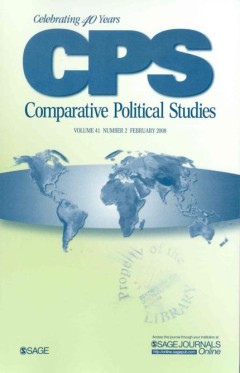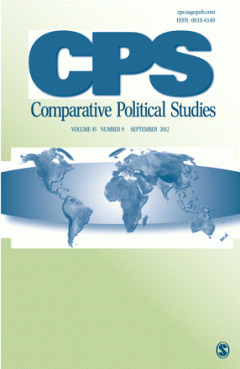Filter by

Social Cleavages and the Number of Parties: How the Measures You Choose Affec…
This article explores the issues surrounding the operationalization and measurement of social cleavages in a large-N context from the perspective of the party systems literature. It first highlights the difficulty of measuring the concept, which it argues has impeded hypothesis testing, and suggests strategies for improving upon existing measures. It then demonstrates that the conclusions we dr…
- Edition
- Vol. 41, No. 11, November 2008. Page 1439-1465
- ISBN/ISSN
- 0010-4140
- Collation
- -
- Series Title
- Comparative Political Studies
- Call Number
- -

When Do Votes Count?: Regime Type, Electoral Conduct, and Political Competiti…
The effects of electoral systems have been tested recently in Africa, raising several questions: Are the systematic effects of electoral rules the same across regime types? Does the conduct of elections affect the process of strategic coordination between voters and parties? The literature to date has not considered these issues and also analyzes elections in settings where a crucial set of its…
- Edition
- Vol. 41, No. 11, November 2008. Page 1466-1491
- ISBN/ISSN
- 0010-4140
- Collation
- -
- Series Title
- Comparative Political Studies
- Call Number
- -

Diverging Developments in Wage Inequality: Which Institutions Matter?
This article investigates how a particular wage-bargaining institution mitigates pressures from growing international competition and new production techniques and affects the degree of wage inequality growth. The extent to which industry-wide wage minima (wage scales) cover both higher and lower skilled workers affects developments in inequality. A series of cross-sectional time-series analyse…
- Edition
- Vol. 41, No. 12, December 2008. Page 1551-1582
- ISBN/ISSN
- 0010-4140
- Collation
- -
- Series Title
- Comparative Political Studies
- Call Number
- -

Representation, Corruption, and Subjective Well-Being
This study examines the effect of corruption and representation on people's subjective well-being. Using cross-national data from 68 countries and survey data from 16 European democracies, the analysis demonstrates that people report higher levels of subjective well-being when (a) their governments perform well (i.e., are clean rather than corrupt) and (b) the party of their choice is in power.…
- Edition
- Vol. 41, No. 12, December 2008. Page 1607-1630
- ISBN/ISSN
- 0010-4140
- Collation
- -
- Series Title
- Sage Publishing
- Call Number
- -

Politics as Usual or Bringing Religion Back In?: The Influence of Parties, In…
This article explains the variation of embryo research laws in the Western world. A quantitative analysis shows that theories of partisan influence, institutions, and economic interests are ill suited to explain this variation. Only when cultural factors are considered can the variation be explained. Catholic societies legislate more strictly, and the Catholic Church is an influential actor. Th…
- Edition
- Vol. 41, No. 12, December 2008. Page 1631-1656
- ISBN/ISSN
- 0010-4140
- Collation
- -
- Series Title
- Comparative Political Studies
- Call Number
- -

The Dynamics of Lawmaking in a Bicameral Legislature: The Case of Brazil
This article analyzes legislative performance in a nascent presidential bicameral democracy, taking Brazil as a case. The author argues that the timing and outcomes of legislative production are functions of bicameral incongruence, types of bicameralism, sequence of examination, and legislative bargaining. These hypotheses are tested using a new legislative data set from Brazil that covers over…
- Edition
- Vol. 41, No. 12, December 2008. Page 1583-1606
- ISBN/ISSN
- 00104140
- Collation
- -
- Series Title
- Comparative Political Studies
- Call Number
- -

Electoral Governance Matters: Explaining the Quality of Elections in Contempo…
This article provides a systematic cross-national analysis of the role of electoral administration in explaining acceptable democratic presidential elections in 19 countries in Latin America since the year 1980 or the first pivotal, transitional election. The authors provide two alternative measures of election administration, one focused on the degree of partisanship or professional independ…
- Edition
- Vol. 41. No. 1, January 2008. Page 73-98
- ISBN/ISSN
- 0010-4140
- Collation
- -
- Series Title
- Comparative Political Studies
- Call Number
- -

Policy Positions, Issue Importance, and Party Competition in New Democracies
This article examines the dynamics of vote redistribution after new party entry in the context of East European democracies. Contrary to the dominant institutional and sociological approaches, the author focuses on the (strategic) policy choices of the new contestants. The author argues that a new party's choice about where to place itself in relation to existing parties and which issues to emp…
- Edition
- Vol. 41, No. 1, January 2008. Page 48-72
- ISBN/ISSN
- 0010-4140
- Collation
- -
- Series Title
- Comparative Political Studies
- Call Number
- -

Who Gives, Who Receives, and Who Wins?: Transforming Capital Into Political C…
How does international support for nongovernmental organizations (NGOs) lead to political change in the developing world? Massive amounts of domestic government spending and international aid are now distributed through NGOs instead of state bureaucracies. Recent scholarship suggests that this decentralization of developmental aid to NGOs has unintended political effects on recipient communiti…
- Edition
- Vol. 41, No. 1, January 2008. Page 24-47
- ISBN/ISSN
- 0010-4140
- Collation
- -
- Series Title
- Comparative Political Studies
- Call Number
- -

Parliamentary Cycles and Party Switching in Legislatures
This article examines politicians' changes of party labels during the life of a legislature. The authors view a legislator's choice of party as a strategic decision recurring throughout the parliamentary cycle. In their approach, individuals are open to switching parties as they pursue goals specific to the stage in the parliamentary cycle. Analyzing Italy and Russia, they identify among legisl…
- Edition
- Vol. 41, No. 1, January 2008. Page 99-127
- ISBN/ISSN
- 0010-4140
- Collation
- -
- Series Title
- Comparative Political Studies
- Call Number
- -

What Unites Right-Wing Populists in Western Europe?: Re-Examining Grievance M…
Unlike for the green party family, no empirically backed scholarly consensus exists about the grievances mobilized by populist right parties in Western Europe. To the contrary, three competing grievance mobilization models can be distinguished in the existing literature. These models focus on grievances arising from economic changes, political elitism and corruption, and immigration. This study…
- Edition
- Vol. 41, No. 1, January 2008. Page 3-23
- ISBN/ISSN
- 0010-4140
- Collation
- -
- Series Title
- Comparative Political Studies
- Call Number
- -

Are Less-Involved Voters the Key to Win Elections?
The literature highlights how different individual levels of political interest and knowledge matter for political attitudes and behavior. A logical-quantitative voting model is thus proposed for a two-party system, based on voters' left—right ideological positions and their degree of political involvement. The model hypothesizes that although more involved voters generally behave in ac…
- Edition
- Vol. 41, No. 2, February 2008. Page 217-241
- ISBN/ISSN
- 0010-4140
- Collation
- -
- Series Title
- Comparative Political Studies
- Call Number
- -

National Actors in International Organizations: The Case of the European Comm…
This article examines the conditions under which the policy positions of an international organization correspond to the positions of relevant national actors. The commission of the European Union (EU) is often portrayed as an autonomous supranational actor, insulated from national interests. Recent analyses question this view, arguing that the commission is an agent in a principal—agen…
- Edition
- Vol. 41, No. 2, February 2008. Page 169-192
- ISBN/ISSN
- 0010-4140
- Collation
- -
- Series Title
- Comparative Political Studies
- Call Number
- -

Theories of Policy Diffusion: Social Sector Reform in Brazil
Brazil's democratic constitution granted municipalities responsibility to design and implement social policies, allowing for tailored programs to meet local constituent demands. Yet instead of pursuing local diversity, many governments chose to emulate programs made famous elsewhere. What explains the diffusion of social programs across Brazil? This article investigates whether policy mak…
- Edition
- Vol. 41, No. 2, February 2008. Page 193-216
- ISBN/ISSN
- 0010-4140
- Collation
- -
- Series Title
- Comparative Political Studies
- Call Number
- -

The Institutional Logic of Welfare Attitudes: How Welfare Regimes Influence P…
Why are people who live in liberal welfare regimes so reluctant to support welfare policy? And why are people who live in social democratic welfare regimes so keen to support welfare policy? This article seeks to give an institutional account of these cross-national differences. Previous attempts to link institutions and welfare attitudes have not been convincing. The empirical studies ha…
- Edition
- Vol. 41, No. 2, February 2008. Page 145-168
- ISBN/ISSN
- 0010-4140
- Collation
- -
- Series Title
- Comparative Political Studies
- Call Number
- -

Agrarian Tenure Institution Conflict Frames, and Communitarian Identities: Th…
Drawing on a survey of more than 4,000 respondents, this article argues that contrary to claims by the 1994 Zapatista insurgency, indigenous and nonindigenous respondents in southern Mexico have been united more by socioeconomic and land tenure institution variables than by ethnic identity. Based on statistical models, it concludes that in rural southern Mexico, ethnicity alone is less importan…
- Edition
- Volume 42, Number 1, January 2009. pp. 82-113
- ISBN/ISSN
- 00104140
- Collation
- -
- Series Title
- Comparative Political Studies
- Call Number
- -

Economic Origins of Electoral Support for Authoritarian Successors: A Cross-N…
This study explores how economic performance prior to democratic transitions affects the fate of successors to authoritarian rulers in new democracies. It investigates 70 founding election outcomes, finding that successful economic performance under an authoritarian regime increases the vote share of successors. It also finds that the past economic performance of authoritarian rulers decr…
- Edition
- Vol. 41, No. 3, March 2008. Page 362-388
- ISBN/ISSN
- 00104140
- Collation
- -
- Series Title
- Comparative Political Studies
- Call Number
- -

Legitimacy and institutional change: the case of China
What explains the nature of institutional change in post-1989 China? Dominant theories of institutional change focus on economic-rationalist, sociopolitical, or historical causes. Yet they have trouble explaining the pattern of institutional change in China. An alternative legitimacy-based perspective is proposed here that provides a more parsimonious and general theory of institutional change …
- Edition
- Vol. 41, No. 3, March. Page 259-284
- ISBN/ISSN
- 0010-4140
- Collation
- -
- Series Title
- Comparative Political Studies
- Call Number
- -

Constraints and Choices: Electoral Participation in Historical Perspective
Participation in electoral politics is not a fully voluntary act. Suffrage rules regulate who can participate, whereas institutional arrangements affect incentives to vote by shaping the consequences of the voting act. The secular increase of electoral participation in the world during the past two centuries was largely due to extensions of suffrage rather than to increased turnout of those eli…
- Edition
- Volume 42, Number 1, January 2009. pp. 4-30
- ISBN/ISSN
- 0010-4140
- Collation
- -
- Series Title
- Comparative Political Studies
- Call Number
- -

Gender Quotas, Electoral Laws, and the Election of Women: Evidence From the L…
This study uses district-level data from national legislative elections in 19 Latin American countries to evaluate the effect of gender quota legislation, in concert with other electoral rules, on the election of women legislators. Well-designed quota legislation has a profound positive impact on the election of women, regardless of the type of party list (closed or open). Where quota legislati…
- Edition
- Volume 42, Number 1, Jabuary 2009. pp. 56-81
- ISBN/ISSN
- 0010-4140
- Collation
- -
- Series Title
- Comparative Political Studies
- Call Number
- -
 Computer Science, Information & General Works
Computer Science, Information & General Works  Philosophy & Psychology
Philosophy & Psychology  Religion
Religion  Social Sciences
Social Sciences  Language
Language  Pure Science
Pure Science  Applied Sciences
Applied Sciences  Art & Recreation
Art & Recreation  Literature
Literature  History & Geography
History & Geography